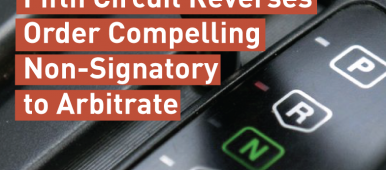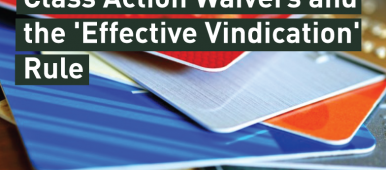
- Mediation
- Arbitration
- Court Neutrals
- Online Dispute Resolution
- Technology
- Court Decisions
- More
- Legislation
- Healthcare
- Guest Posts
- John DeGroote
- John C. Fleming
- Rick Freeman
- Professor Peter Friedman
- Honorable W. Royal Furgeson, Jr.
- James M. Gaitis
- Laura A. Kaster
- Professor John Lande
- Philip J. Loree, Jr.
- Michael McIlwrath
- F. Peter Phillips
- Professor Alan Scott Rau
- Professor Thomas J. Stipanowich
- Professor S.I. Strong
- Richard Webb
- Glen M. Wilkerson
- International arbitration
- Regulation
- Sports and Entertainment
- We’re Back!!!!Well, it’s been a while since we published and that is about to change. Since I spent much of last year becoming
 JAMS Welcomes Karl Bayer to its Panel of NeutralsJAMS, the world’s largest private alternative dispute resolution (ADR) provider, is pleased to announce that Karl Bayer
JAMS Welcomes Karl Bayer to its Panel of NeutralsJAMS, the world’s largest private alternative dispute resolution (ADR) provider, is pleased to announce that Karl Bayer Class Action Waivers in Arbitration Agreements: The Twenty-First Century Arbitration Battleground and Implications for the EU CountriesLinda S. Mullenix, Morris & Rita Atlas Chair in Advocacy at the University of Texas School of Law, has written “Class Ac
Class Action Waivers in Arbitration Agreements: The Twenty-First Century Arbitration Battleground and Implications for the EU CountriesLinda S. Mullenix, Morris & Rita Atlas Chair in Advocacy at the University of Texas School of Law, has written “Class Ac Picking the Proper Technological Tool for Problem-Solving in ArbitrationProfessor Amy J. Schmitz, John Deaver Drinko-Baker & Hostetler Chair in Law and Co-Director of the Translational Data An
Picking the Proper Technological Tool for Problem-Solving in ArbitrationProfessor Amy J. Schmitz, John Deaver Drinko-Baker & Hostetler Chair in Law and Co-Director of the Translational Data An
Recent Posts
Houston Appeals Court Opens Door for Single-Party Arbitration Agreements
Houston’s 14th District Appeals Court has reversed a district court’s order denying a company’s motion to compel arbitration. In Cotton Commercial USA, Inc. v. Clear Creek Independent School Dist. (Tex.App.–Houston [14 Dist.], 2012), the Clear Creek Independent School District (“School District”) contracted with Cotton Commercial USA, LP (“Contractor”) for debris removal following Hurricane Ike. A restoration services agreement signed by the parties contained an agreement to arbitrate any disputes related to work performed as part of the contract. In addition, the agreement specifically authorized the use of subcontractors to complete the work and provided for a 20 percent mark-up where a subcontractor was used. In September 2008, the hurricane debris was reportedly removed by Cottonwood Debris Company, LLC (“Subcontractor”). After Contractor submitted bills that included a mark-up for Subcontractor’s services, the School District questioned the relationship of the two parties and refused to pay the mark-up rate. The School District also alleged that Subcontractor submitted a number of fraudulent invoices for work that was never performed. Contractor and Subcontractor were later merged to form Cotton Commercial USA, Inc. (“Cotton Commercial”). In December 2010, the School District filed a lawsuit against Cotton Commercial alleging fraud. In May 2011, Cotton Commercial filed a motion to stay court proceedings and compel the dispute to arbitration. The company also asserted a number of counterclaims against the School District. The district court denied Cotton Commercial’s motion to compel arbitration with regard to the School District’s claims against the company and granted Cotton Commercial’s motion related to the company’s counterclaims. Cotton Commercial then appealed the trial court’s order denying the company’s motion to compel the parties to arbitration over the School District’s claims. The School District did not appeal either of the lower court’s orders. On appeal, the School District argued that it filed a lawsuit against Cotton Commercial because Subcontractor was merged with the company and ceased to exist. In addition, the School District stated it should not be compelled to arbitrate because there was no contract between the two parties. According to Houston’s 14th District, although an agreement to arbitrate is generally only enforced between signatories, exceptions do exist. Despite that a corporate relationship between Cotton Commercial, Contractor, and Subcontractor “is insufficient to compel arbitration,” the court stated, …the Texas Supreme Court recognizes an “intertwined-claims” test that has been applied by other courts in circumstances where a nonsignatory defendant has a “close relationship” with one of the signatories and the claims are “‘intimately founded in and intertwined with the underlying contract obligations.’” After finding the School District’s claims were “completely interwoven” with the parties’ restoration services agreement, the appeals court said, The School District is a signatory to the Restoration Agreement. The School District agreed to arbitrate “any controversy, dispute or claim arising out of [the Restoration Agreement] or the Work done [thereunder].” The School District cannot artfully choose its defendant or plead its claims to avoid arbitration. In addition, the court dismissed the School District’s public policy argument by stating, It would be contrary to Texas policy favoring arbitration and against artful pleading to avoid arbitration to allow the School District to avoid its agreement to arbitrate claims or to piecemeal such claims in two forums simply because its contracting counterpart has merged with another company. Next, the appellate court addressed the scope of the parties’ agreement to arbitrate. According to the court, the arbitration agreement at issue was extremely broad and the factual allegations in the complaint were sufficient to prove the dispute fell within the scope of the agreement. Finally, Houston’s 14th District Appeals Court reversed the district court’s order denying Cotton Commercial’s motion to compel arbitration with regard to the School District’s claims against the company and remanded the case.
Continue reading...Graying Federal Judges Weigh Consequences of Retirement
The Honorable W. Royal Furgeson, Jr., Senior U.S. District Court Judge for the Northern District of Texas, has published an interesting article in the February 2013 Texas Bar Journal entitled “Senior Judges of the Federal Courts: Their Choices and the Consequences.” In the article, Judge Furgeson discusses the often difficult choices federal judges face after reaching retirement age and the effect those choices can have on both a judge’s ability to earn a living and the federal judicial system as a whole. Once a federal judge is eligible for retirement, he or she may choose to receive an annuity equal to the rate of pay received at retirement or to continue working as a senior judge. Although retired federal judges may engage in outside employment, senior judges remain subject to a number of limitations on outside-earned income. In the article, Judge Furgeson discusses in detail the current trend for senior federal judges to continue conducting trials. Presently, many federal judges who reach retirement age choose to remain on the bench as a senior judge. In fact, more than one-quarter of all federal trials were reportedly held before a senior judge in 2009. In addition, more than 20 percent of cases terminated before a senior judge during the same year. According to Judge Furgeson: The fact is, if there were any significant negative change in the number of federal judges taking senior status instead of retiring, the impact on the federal judiciary would be devastating. The article concludes by stating the federal judicial system would see dramatic bottlenecks if the federal judiciary begins retiring in larger numbers. Although Judge Furgeson states many aging federal judges continue working due to interesting work and a desire to serve the public, he reportedly believes this may change in the future as a direct result of salary erosion.
Continue reading...Fifth Circuit Reverses Order Compelling Non-Signatory to Arbitrate
In an unpublished opinion, the Fifth Circuit has reversed a United States District Court’s order compelling a ship builder and a propulsion system manufacturer to arbitrate a dispute between them. In VT Halter Marine, Inc. v. Wartsila North America, Inc., No. 12-60051, (5th Cir. Feb. 8, 2013), a ship operator, Vessel Management Services, Inc. (“Vessel Management”) contracted with a ship manufacturer, VT Halter Marine, Inc. (“VTHM”), to build a number of large vessels. The contract between the parties did not contain an arbitration clause. Vessel Management also contracted with Wartsila North America, Inc. (“Wartsila”) to purchase several vessel propulsion systems for the ships that VTHM was building. The contract between Vessel Management and Wartsila contained an arbitration clause that stated: This Agreement shall be construed in accordance with the laws of the State of New York, without reference to its conflict of laws provisions. Any dispute between the parties arising out of or in connection with this Agreement shall be finally settled under the Rules of Arbitration of the American Arbitration Association by one or more arbitrators appointed in accordance with the said rules, in New York, New York. VTHM did not enter into a contract with Wartsila and was not a signatory to the contract between Vessel Management and Wartsila. Once the propulsion systems were completed, however, Wartsila delivered them directly to VTHM for installation. After the propulsion system on one of the ships built by VTHM failed inspection, Vessel Management demanded that VTHM purchase a new propulsion system. According to VTHM, Vessel Management did so based on Wartsila’s misrepresentation regarding the quality of VTHM’s workmanship. VTHM eventually purchased the new system in an effort to avoid paying any potential liquidated damages. VTHM later filed a lawsuit against Wartsila in the United States District Court for the Southern District of Mississippi alleging breach of warranty and tortious interference with contractual relations. According to VTHM, the company stood in the shoes of Vessel Management for purposes of equitable subrogation. Wartsila responded by filing a motion to compel arbitration. Although VTHM conceded that its breach of warranty claim was subject to arbitration, the company argued that its tortious interference claim was not. Still, the district court ordered both claims to arbitration and dismissed the case. VTHM then filed an appeal in the Fifth Circuit. Initially, the appeals court dismissed Wartsila’s claim that de novo was an incorrect standard of review because the district court relied on principles of equitable estoppel. According to the court: Wartsila provides no case, and we can find none, where this Court reviewed for abuse of discretion a district court order compelling arbitration that did not clearly apply equitable estoppel. Because there is no indication from the district court’s order that it applied equitable estoppel, we assume that it did not. Next, the Fifth Circuit said, This Court in Pennzoil articulated the two general requirements for compelling a party to arbitrate a particular dispute: the court must determine both that (1) the two parties have a valid agreement to arbitrate, and (2) the dispute in question falls within the scope of that arbitration agreement. 139 F.3d at 1065. According to the Fifth Circuit, the lower court completely overlooked the fact that VTHM was not a party to the sales contract that contained an arbitration clause. Instead, the appeals court said the district court incorrectly addressed the scope of the agreement. Finally, the appellate court held, Ultimately, regardless of whether the district court correctly understood the nature of the contracts between the parties, Wartsila concedes that it has no valid agreement to arbitrate with VTHM. Thus, the first requirement of Pennzoil cannot be satisfied; VTHM cannot be compelled to arbitrate under general arbitration principles and the district court erred in so holding. We decline to determine whether equitable estoppel compels arbitration at this point. Instead, we remand this case to the district court to determine whether direct benefits equitable estoppel applies, as Wartsila urges. The Fifth Circuit reversed the lower court’s holding and remanded the case for a determination regarding whether an exception that binds non-signatories to an arbitration agreement applied.
Continue reading...Arbitrating Antitrust Claims, Class Action Waivers and the ‘Effective Vindication’ Rule
Professor Linda S. Mullenix, Morris & Rita Atlas Chair in Advocacy at the University of Texas School of Law, has published a research paper entitled “Arbitrating Federal Antitrust Claims, Class Action Waivers, and the ‘Effective Vindication’ Rule,” Univ. of Texas Law, Public Law Research Paper No. 349. The paper is a preview of the issues before the United States Supreme Court in American Express Corp. v. Italian Colors Restaurant, et al. (No. 12-133). The appeal from the United States Court of Appeals for the Second Circuit addresses whether the Federal Arbitration Act permits a court to invalidate an arbitration agreement that does not permit class arbitration of a federal law claim. The case is currently set for oral argument on February 27, 2013. Here is the abstract: This article previews the issues and arguments in American Express Corp. v. Italian Colors Restaurant, et al., on the Court’s 2012-13 docket, to be argued February 27, 2013. The respondent retail merchants entered into agreements with petitioner American Express detailing how the respondents would accept Amex’s credit and charge cards. Respondents brought a Sherman Antitrust Act lawsuit against Amex, claiming that Amex used its monopoly power to force merchants to accept the agreement. Amex responded that the agreement requires arbitration, but prohibits classwide arbitration. The Court must now determine the effect in a federal Sherman Antitrust Act action of an arbitration clause that prohibits classwide arbitration, but where enforcement of the arbitration clause would effectively prevent the plaintiffs from vindicating their rights in the arbitral forum. This appeal represents the third time in three years that the Supreme Court will consider the nature and scope of an arbitration agreement that contains a class action waiver — that is, a provision that does not permit an arbitration to be resolved on a classwide basis. In spite of this, the plaintiffs below (the respondents on appeal) contend that this case does not concern classwide arbitration at all, and that the classwide arbitration issue is a red herring. The primary issue the Court will address is whether a federal court may invalidate an arbitration agreement that a defendant invokes to resolve a Sherman Antitrust Act claim when the arbitration agreement does not permit class arbitration, but where the litigant has shown that it would be unable to effectively vindicate its federal statutory rights to prosecute the antitrust claim in the arbitral forum? Amex is significant because of the pervasiveness of arbitration provisions in modern commercial and consumer transactions, and the need for certainty in the interpretation and application of these provisions. Judicial reception to the use of arbitration as a means of alternative dispute resolution has shifted over time. Whereas courts once viewed such provisions with antipathy, courts now embrace the public policy doctrine favoring such private dispute resolution auspices. Nonetheless, this shift in appreciation for arbitration has occurred in a litigation landscape characterized by two-party disputes. In the past decade, the emergence of classwide arbitration has taken contracting parties and the courts somewhat unaware. The prevalence of disputes over classwide arbitration, then, has exposed a challenging issue for ensuring certainty in dispute resolution. Moreover, fundamental public policy issues underlie the litigation over class action waivers in arbitration agreements. In addition, courts now recognize that the costs associated with certain types of complex litigation may effectively render arbitration impossible. The Court’s evolving arbitration jurisprudence has shaped corporate transactional behavior. Corporate defendants typically seek to insure against the unintended consequences of classwide arbitration by specifically prohibiting it through contractual language. However, as respondents point out, corporate defendants increasingly haveincluded more nuanced provisions in arbitration clauses to make arbitration more attractive to potential plaintiffs. These additional provisions include such measures as cost-shifting and payment of filing and arbitration fees. On the other hand, plaintiffs seek to ensure access to arbitral justice by invoking unconscionability doctrines or the effective vindication rule. On a number of occasions now, the Court has tried to provide guidance for the construction and application of arbitration clauses that either are silent with regard to classwide arbitration or that contain class action waivers. In its most recent venture, the Court in Concepcion rather thoroughly canvassed all arguments in favor of and opposition to the enforcement of class action waivers, albeit on review of a state Supreme Court decision. The Amex appeal re-canvasses much the same arguments as in Concepcion, only the context of purported enforcement of federal antitrust statutes (rather than state law claims). It remains to be seen whether the different procedural posture makes a material difference for the Court’s appreciation of class action waivers, or whether this appeal causes the Court to further qualify its Randolph, Stolt-Nielsen, and Concepcion decisions. In addition to the class action waiver dispute, this appeal also offers the Court the opportunity to clarify the effective vindication rule and address that it was mere dicta in Randolph or an important consideration in the enforceability of arbitration clauses. The Randolph decision sets forth the effective vindication rule, adopted by many federal courts, and this appeal offers the Court an opportunity to revisit the scope of this doctrine. The full text of the paper is available for download from the Social Science Research Network, along with other articles written by Professor Mullenix.
Continue reading...Arbitration
Part 1 of 3 This is the first installment in a three Part series on the role of Artificial Intelligence in Online Dispute Resolution. Please join the conversation and comment below. One of arbitration’s principle advantages is the informality with which the process is carried out.[1] Informality may lead to increased speed of dispute resolution and reduced costs.[2] However, recently arbitration has taken on some of the formal attributes of litigation, and as a result, has reduced its advantages and decreased its desirability.[3] In response to this problem, there is a not-so-conventional answer: Online Dispute Resolution (ODR). The use of Online Dispute Resolution can help arbitration maintain its traditional informality, cost-effectiveness, and speed through the use of Artificial intelligence (AI) to help streamline processes for an arbitrator and the disputants. ODR originally referred to processes for dispute resolution that relied on Information and Communication Technology (ICT) and were offered through the internet for addressing conflicts that arose online.[4] Subsequently, the use of these processes and mechanisms by ODR systems expanded to include aiding in the resolution of offline disputes.[5] Understood in this way, ODR can mean any number of things, for example: Electronically delivered briefs Videoconference hearings Fully automated online process It is essentially any form of dispute resolution facilitated by ICT. Just like traditional arbitration, ODR has gained popularity as a means of facilitating inexpensive dispute resolution. Disputants can take advantage of ODR’s best features: Disputants do not have to meet face to face The resolution process may occur whenever it is convenient for the parties Asynchronous communication is possible[6] These features make ODR particularly suited for international commerce and e-commerce, where the disputants may be geographically separated or where the amount in controversy may be small. Potential ODR users include internet service providers, data providers, e-commerce websites, and internet payment systems[7]—all sources of disputants with particular need for a quick, efficient resolution system in the same medium in which the dispute arose: the internet. ODR in Use Cybersettle and eBay’s dispute resolution systems provide particularly good examples of approaches to ODR: Cybersettle has saved New York City, which used the program for personal injury and property damage claims against the City, an estimated $70,167,494 in costs.[8] Their patent for a “computer executable system and method for dispute resolution”[9] uses an “online, double-blind bid, dispute resolution system[.]”[10] In this online dispute resolution system, offers and demands are matched to reach an agreement.[11] Dispute resolution on eBay—which employs SquareTrade to assist in handling claims—is a little more involved. Customers with a complaint can resolve it in one of two ways: through a free internet forum to negotiate a settlement or with the help of a mediator (subsidized by eBay so that the cost is only $15).[12] eBay has resolved disputes quickly and cheaply, as well as “uncover[ed] common sources of problems and . . . structure[d] information on its site so that these problems do not recur.”[13] These models provide parties with a range of options tailored to the disputants’ needs, unlike simply an online courthouse model like iCourthouse.[14] By combining the connectivity potential of ICT with dispute resolution procedures, clients have a process that can increase efficiency and speed, while lowering costs and providing an easy-to-use dispute resolution system. Stay Tuned for Part 2 on Digital Disagreements where we discuss examples of AI use with ODR, Concerns raised by AI use in ODR, and the role of People in ODR! *Grant is a J.D. and Master of Public Affairs candidate at the University of Texas. He will graduate in 2014. In addition to law, Grant enjoys hiking, soccer, and watching Law & Order.
Continue reading...Mediation
Healthcare Disputes
Legal Research
About Disputing
Disputing is published by Karl Bayer, a dispute resolution expert based in Austin, Texas. Articles published on Disputing aim to provide original insight and commentary around issues related to arbitration, mediation and the alternative dispute resolution industry.
To learn more about Karl and his team, or to schedule a mediation or arbitration with Karl’s live scheduling calendar, visit www.karlbayer.com.













